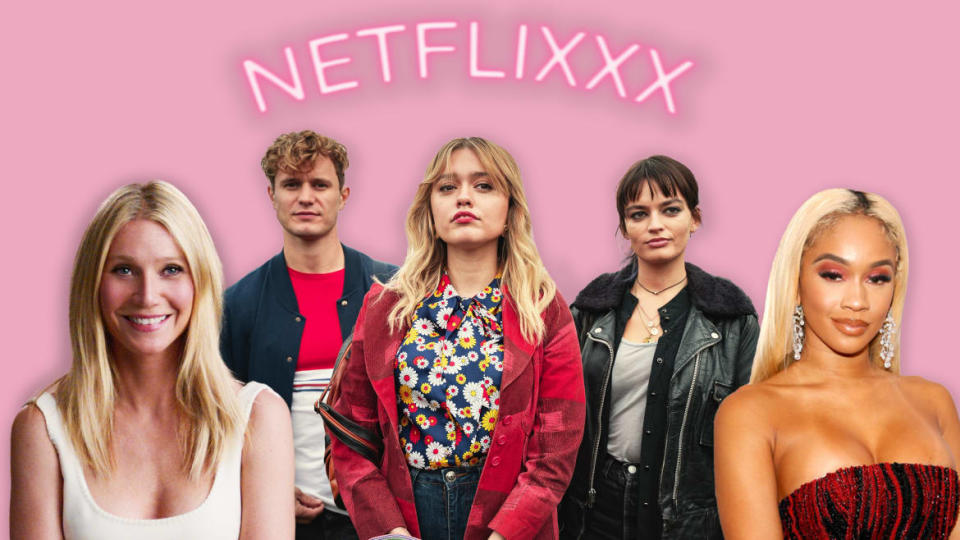Netflix Is Taking Over Sex Education. Does It Even Know What It’s Doing?

Gwyneth Paltrow’s first Netflix series, The goop Lab, stirred controversy from its debut. Scientists were frustrated with the streaming giant for spreading misinformation—and even worse, the show was also boring.
Now, however, Paltrow returns with a new series, Sex, Love & goop. The show observes a handful of couples (most but not all of whom are straight) as they meet with sex therapists to address various issues in their relationships. While The goop Lab felt like a well-produced QVC ad for expensive quackery, Sex, Love & goop takes an earnest, emotionally driven approach to a topic that remains embarrassingly taboo in the U.S.
Beyond offering yet another brand extension for Gwyneth Paltrow, Sex, Love & goop also tightens Netflix’s grip on a relatively new TV niche: educational programming that normalizes sex.
How Marcia Cross Brought Her Scheming ‘Desperate Housewives’ Energy to Netflix’s ‘You’
Shows like Big Mouth and Sex Education use sharp comedy and empathy to encourage teen viewers to treat themselves with understanding. These programs reject the melodrama of Degrassi or the preachiness of 7th Heaven in favor of something more human—even if one of them is an animated series in which the Statue of Liberty comes alive to complain about period cramps. There was also last year’s Sex, Explained, a docuseries hosted by Janelle Monae, as well as the upcoming Sex: Unzipped, a “celebration of sexual health and positivity” featuring Saweetie.
Should we worry about the fact that these shows are “airing” on the same platform that waited two years to cut a suicide scene in 13 Reasons Why despite experts’ warnings and the emergence of apparent copycats? (A study in 2019, released months before the scenes were cut, found that a spike in teen suicides had followed the show’s release.) Is it concerning that these shows’ titles might sit next to, over, or under that transphobic Dave Chappelle special? Or that the guy responsible for programming all of these things is still struggling to prove that he understands how his decisions impact the real world?
It was strange to watch Sex, Love & goop—which I mostly liked—and consider how its message of safety and empathy stacks up against the other content on Netflix.
Streaming platforms don’t incorporate ethos into their brand identities the same way traditional networks have. (NBC is for young city dwellers and “coastal elites,” ABC is for family comedies, et cetera.) Rather than cultivate a singular brand identity, Netflix has replicated cable television in its entirety. Viewers can scroll through Food Network lookalikes, HGTV-like real estate programming, and A&E-like docuseries alongside flashier originals and a slowly dwindling selection of library content.
It can be strange, then, to consider two Netflix originals like Sex, Love & goop and Chappelle’s The Closer side by side. But Netflix has also worked for years to make inclusivity part of its brand, launching targeted social media accounts like Most and creating content categories like the Black Lives Matter Collection. If Netflix wants to maintain a cohesive brand ethos when praise is on the table, should that brand not also bear responsibility when it falls short?
Luna Matatas, a sex and pleasure educator based in Toronto, recently pointed out to CBC that in spite of its best intentions, Sex, Love & goop remains limited in scope.
“There are lots of barriers for people who are underrepresented and marginalized within sex education,” Matatas said. “We don’t see queer inclusivity, we don’t see fat bodies, we don’t see disabled bodies, we don’t see trans bodies, you know, intersex bodies.”
When they first debuted, neither Sex Education nor Big Mouth featured trans characters. Last year, Netflix released Disclosure—a documentary that outlines how trans erasure and anti-trans media foster violence against trans people in real life. Even now, however, it seems that Ted Sarandos—who, it’s worth repeating, said just a week ago that “content on screen doesn’t directly translate to real-world harm”—does not actually understand how any of his decisions affect his viewers or the culture they help create.
In his most recent mea culpa—an interview with Deadline—the co-CEO was asked whether the strong reaction to the anti-trans humor in Chappelle’s The Closer had surprised him. His response does not exactly inspire confidence.

The Singing Tampon in Netflix’s Big Mouth
“It’s impossible to please everybody, but we are trying to please a world that is made of people of different tastes, sensibilities and beliefs, and it becomes very difficult to do that for everybody,” Sarandos said. This would be the appropriate response to give someone who is being cranky about the office lunch order, but it seems like a pretty demeaning one to people who are literally just asking you not to promote material that threatens their lives.
“We have stated it internally that we are going to have some things on Netflix that you don’t like,” Sarandos continued. “There are some things on Netflix that may be harmful to you, your colleagues and your friends but we are trying to entertain the world and make business decisions that are protective of creative freedom and artists and also respectful, safe workspace.” Was this supposed to sound good?
Perhaps Gillian Anderson’s Sex Education character can give Ted a… sex education.
Get our top stories in your inbox every day. Sign up now!
Daily Beast Membership: Beast Inside goes deeper on the stories that matter to you. Learn more.

 Yahoo Movies
Yahoo Movies 